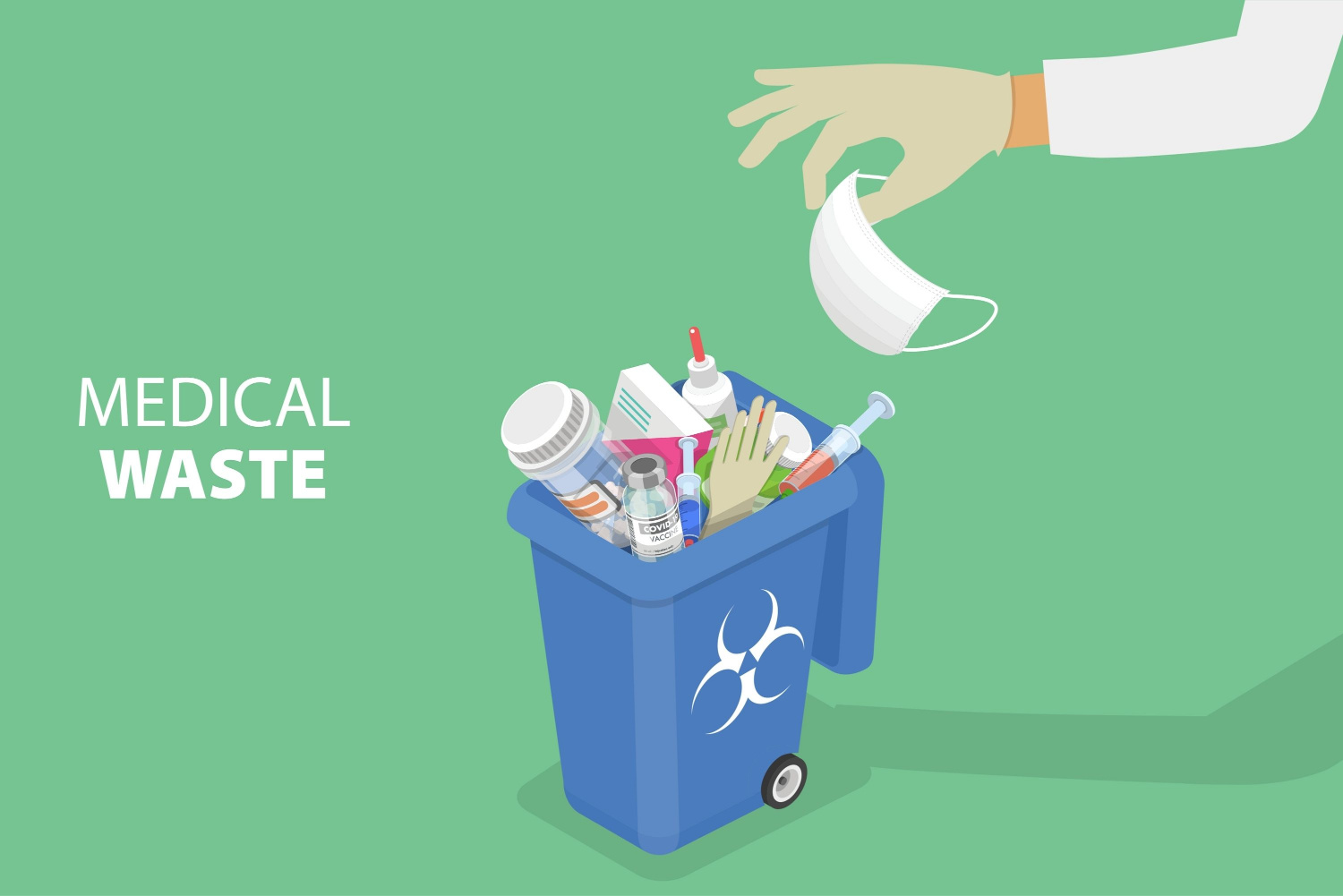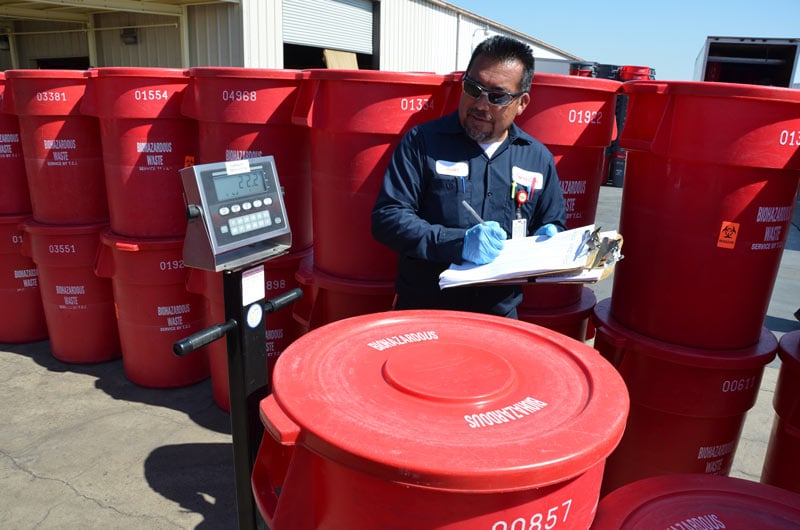Efficient and Liable Medical Waste Removal: Protecting Individuals and the Earth
Wiki Article
Reliable Techniques of Medical Waste Disposal
Reliable approaches of medical garbage disposal are critical in preserving public health and ecological safety. Medical waste, including sharps, pathological waste, and pharmaceutical waste, have to be taken care of and dealt with properly to protect against the spread of infections and safeguard the atmosphere. This calls for adherence to rigorous policies and the implementation of professional waste monitoring techniques.Correct segregation of clinical waste, secure and safe storage, efficient treatment and sanitation methods, and environmentally-friendly disposal choices are key elements of an efficient medical garbage disposal system. Professional waste administration solutions play an important duty in guaranteeing conformity with policies and lessening the risks connected with inappropriate disposal. By using these methods, medical care facilities can add to a much safer and cleaner setting while safeguarding the well-being of the community.
Appropriate Segregation of Medical Waste
Appropriate partition of clinical waste is important for ensuring the safe and effective disposal of these possibly harmful products. Medical waste refers to any type of waste created throughout medical care tasks, such as medical facilities, centers, labs, and study centers. It consists of a wide range of materials, such as used needles, syringes, contaminated dressings, expired or unused drugs, and organic materials.By setting apart medical waste, medical care facilities can decrease the danger of infections, injuries, and environmental contamination. The process entails classifying waste into different kinds, such as sharps, contagious waste, pharmaceutical waste, and non-hazardous waste. Each kind requires particular handling, product packaging, and disposal techniques to stop exposure to medical care workers, waste administration personnel, and the public.
To make sure appropriate segregation, medical care centers ought to develop clear guidelines and offer adequate training to personnel. This includes informing employees on the various waste classifications, proper product packaging techniques, and using ideal containers - WasteX Medical Waste Disposal. In addition, clear signage and color-coding systems can be applied to assist in the identification and partition of different waste kinds
Safe and Secure Storage of Medical Waste
Safe and safe storage space of clinical waste is critical for maintaining the honesty and control of possibly unsafe products. Appropriate storage space not just protects healthcare employees and the public from direct exposure to harmful materials yet additionally prevents ecological contamination.To ensure safe storage, clinical facilities must stick to details guidelines. Firstly, waste must be stored in leak-proof and puncture-resistant containers that are identified suitably. These containers ought to be firmly sealed to avoid any leak or spills. In addition, the storage space area should be inaccessible and secure to unapproved employees, lessening the danger of unexpected exposure.
Appropriate segregation of medical waste is also vital for secure storage space. Various kinds of waste, such as sharps, infectious products, and pharmaceutical waste, ought to be divided to avoid cross-contamination. This segregation can be attained through using color-coded containers or containers.
Routine monitoring and inspection of the storage space location are essential to determine any potential threats or breaches. This includes monitoring for indicators of damage or degeneration in the containers, ensuring appropriate ventilation, and keeping track of temperature and moisture levels.
Efficient Therapy and Sanitation Methods

One frequently used therapy approach is autoclaving, which includes subjecting the waste to high-pressure heavy steam at temperatures above 121 levels Celsius. This procedure properly eliminates microorganisms and ruins contagious agents, providing the waste risk-free for further disposal. Another technique is incineration, which includes burning the waste at high temperatures. Incineration not only removes microbes yet likewise decreases the waste volume through burning.
Chemical disinfection is an additional effective method for treating medical waste. This method involves making use of disinfectants such as chlorine compounds, phenolic substances, or hydrogen peroxide to eliminate or suspend virus (WasteX Medical Waste Disposal). Chemical sanitation is usually utilized for liquid waste, such as research laboratory examples or bodily liquids
Recently, different treatment methods such as microwave sanitation, irradiation, and biological treatment have actually additionally gotten focus. These techniques supply advantages such as decreased environmental effect and power intake contrasted to conventional approaches.
Environmentally-friendly Disposal Options
In the realm of medical waste disposal, considering environmentally-friendly alternatives is critical. Health care centers produce a considerable quantity of waste, including contagious products, pharmaceuticals, and chemicals, which can position significant dangers to human health and the setting if not handled properly. The good news is, there are numerous environmentally-friendly disposal alternatives readily available that can help minimize these threats.
One such alternative is recycling. Reusing clinical waste involves segregating and processing specific products for reuse or repurposing. Plastics, glass, and steel containers can be recycled, decreasing the need for new products and decreasing the amount of waste sent to landfills. In addition, some medical care facilities have executed recycling programs for certain medical tools or tools, additional lowering waste generation.
An additional environmentally-friendly disposal alternative is waste-to-energy conversion. This method entails transforming medical waste into energy with procedures like incineration or anaerobic digestion. medical waste disposal service. Incineration, when done properly with innovative technologies, can produce energy while lessening hazardous emissions. Anaerobic digestion, on the various other hand, breaks down natural waste in the lack of oxygen, creating biogas that can be utilized for electrical energy or warm generation.

Benefits of Specialist Waste Monitoring Solutions
One significant advantage of expert waste management solutions is the improved efficiency in disposing and managing of medical waste. Medical care facilities generate a substantial amount of waste that consists of harmful materials, such as sharp items, contaminated products, and potentially transmittable waste. medical waste removal service. Incorrect handling and disposal of clinical waste present serious health and wellness risks to staff members, clients, and the public. By utilizing specialist waste management solutions, healthcare facilities can make certain that all clinical waste is handled and dealt with properly, lessening the threat of contamination and the spread of diseases.Expert waste management services employ qualified and seasoned employees that are well-informed concerning the regulations and guidelines for medical waste disposal. They have access to specialized devices and tools that enable them to deal with different sorts of medical waste safely and efficiently. These services additionally have reputable treatments and procedures in position to make sure that waste is set apart, packaged, delivered, and disposed of in conformity with regional, state, and federal policies.
Furthermore, professional waste management services can provide healthcare centers with thorough waste monitoring options. They can use services such as waste collection, therapy, transportation, and disposal, tailored to the specific demands and demands of the center. This gets rid of the concern of managing waste inside, permitting health care staff to concentrate on offering quality person treatment.
Conclusion
To conclude, efficient methods of medical garbage disposal include proper segregation, safe storage, treatment and sanitation, and environmentally-friendly disposal options (WasteX Medical Waste Disposal). These techniques ensure the risk-free handling and monitoring of medical waste, stopping the spread of infections and shielding the environment. Expert waste management services play a crucial function in carrying out these approaches and ensuring conformity with guidelines. By complying with these practices, health care facilities can add to a much safer and much healthier atmosphere for both clients and the area.Clinical waste, including sharps, pathological waste, and pharmaceutical waste, must be managed and disposed of correctly to stop the spread of infections and secure the environment.Appropriate segregation of clinical waste, risk-free and secure storage space, effective therapy and disinfection methods, and environmentally-friendly disposal choices are vital elements of an effective medical waste disposal system. The procedure entails classifying waste into different types, such as sharps, infectious waste, pharmaceutical waste, and non-hazardous waste. By utilizing specialist waste management solutions, medical care facilities can guarantee that all clinical waste is taken care of and disposed of appropriately, decreasing the risk of contamination and the spread of conditions.
Specialist waste monitoring services utilize skilled and here are the findings skilled personnel who are experienced regarding the guidelines and guidelines for medical waste disposal.
Report this wiki page